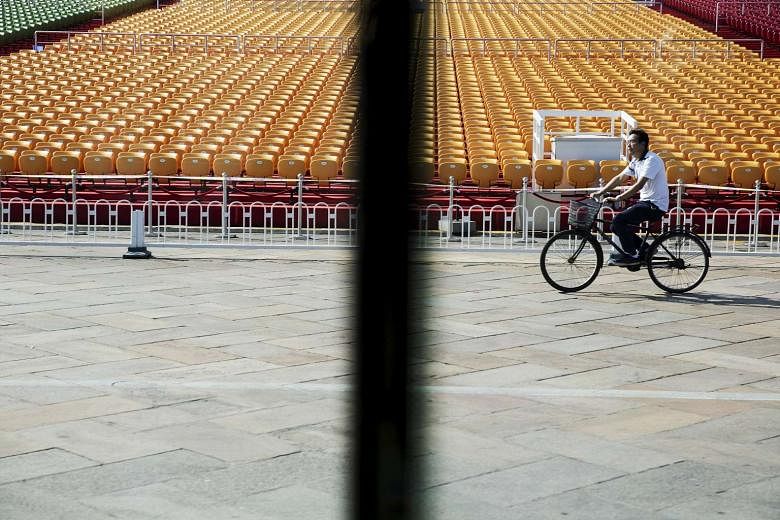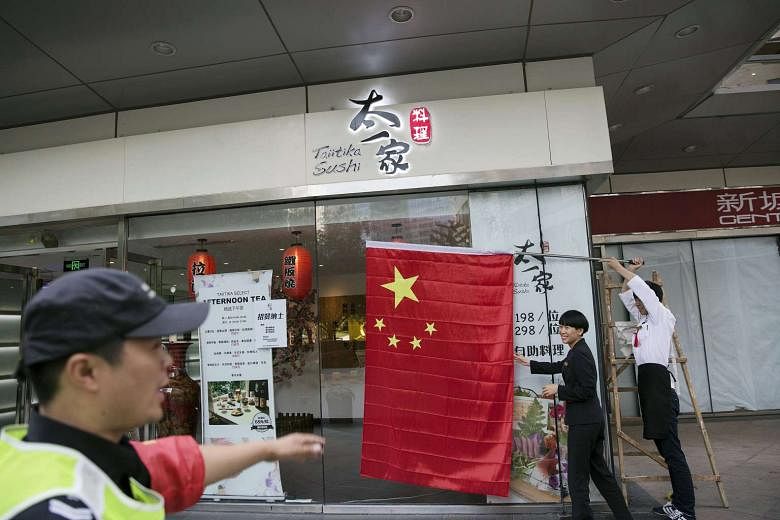China is staging what's been billed as the first-of-its-kind military parade on Thursday (Sept 3) to mark the 70th anniversary of the end of World War II .
The event allows President Xi Jinping to further consolidate his power and to push a much bolder nationalist agenda. But major Western leaders are shunning the show as Beijing assumes an increasingly assertive role on the global stage.
Here's what you should know about the parade:
What are the highlights of the celebration?
A 70-gun salute will kick off the proceedings in the morning, while Mr Xi will deliver a speech before the start of the parade. The display, which is expected to last 70 minutes, will feature 12,000 troops and 40 types of modern weapons system, in the first such World War II-themed parade Beijing has held on Tiananmen Square.
A total of 17 countries are sending troops to take part, including Russia, Mongolia, Cuba, Serbia and Mexico.
What is the significance to China?
For the Chinese president, foreign perceptions about the parade are less important than what the event tells Chinese citizens about the strength of their country and its leader.
"It's a way to further consolidate power," said Hu Xingdou, a professor of political economy at the Beijing Institute of Technology. "Internally, it's meant to showcase solidarity and strength under his leadership. Externally, Mr Xi wants to use the parade as a statement on China's rising political profile on the global stage."
The "I'm-in-control" message won't be wasted on the generals of the People's Liberation Army (PLA) and the 2.3 million personnel they command. Mr Xi's anti-corruption campaign has ensnared dozens of past and present top brass, including Guo Boxiong, the PLA's former top uniformed officer.
The event also allows Mr Xi to push a much bolder nationalist agenda just as the Chinese public is beginning to question the communist party's main source of legitimacy: its ability to deliver economic growth. His government is facing challenges including questions about safety regulation after the Tianjin blast that killed at least 158 people, faltering economic growth, and concerns about the outlook for the stock market, whose plunge wiped out US$5 trillion (S$7.07 trillion) in global stock value.
While Mao Zedong, founder of Communist China, oversaw several military parades, Chinese leaders have in recent years restricted such events to 10-year anniversaries of the country's founding in 1949. Mr Xi's predecessor Hu Jintao hosted the last one in 2009.
"Xi will be very concerned that nothing goes wrong as this is a government that really wants to be seen to be given 'face' internationally and is trying to shore up its image to the Chinese population," said Anne-Marie Brady, a professor at the University of Canterbury in Christchurch, New Zealand.
Why key Western leaders are shunning the parade?
Key leaders from Western countries such as the United States, Britain, Germany and Canada will not be attending the parade but will send their representatives.
European and US officials have repeatedly expressed concern that the show of military power could send the wrong signal in an already tense region, where China has been taking a more assertive approach to its territorial disputes.
The parade comes as Beijing is engaged in high-profile maritime disputes with neighbours in the South China Sea, where it is building artificial islands and facilities with military uses, and with Japan over disputed outcrops.
It also coincides awkwardly with increasing doubts about the capability of Mr Xi and the country's other leaders to manage a growth slowdown that has spooked domestic and foreign financial markets.
The attendance of Russian President Vladimir Putin has also put off many Western leaders, according to diplomats. Mr Putin has been shunned by major Western leaders over the annexation of Crimea and fighting in eastern Ukraine.
Which foreign leaders are attending?
Thirty heads of state are attending, including presidents of South Korea, Myanmar, Pakistan, Russia, Kazakhstan, Laos, Serbia, Sudan, Venezuela and Czech Republic.
France and Italy will send their foreign ministers, while the governments of the US, Germany and Canada will be represented by their resident ambassadors. Former British prime minister Tony Blair will attend the parade but not in an official capacity.
SOURCES: AFP, REUTERS , BLOOMBERG, THE STRAITS TIMES ARCHIVES



